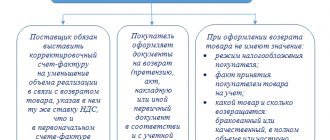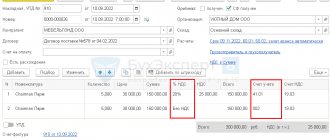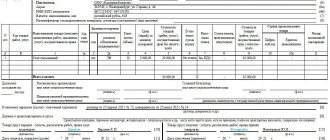Supply contract under the Civil Code of the Russian Federation
According to the Civil Code of the Russian Federation, a contract for the supply of goods is a document that allows you to formalize a transaction in writing, under the terms of which one entity (supplier-entrepreneur) is obliged to supply high-quality commercial products of a certain range within a specified time frame and at an agreed price, and the other (buyer) is obliged to accept the delivered products and pay no later than the agreed date.
The main regulatory document defining the legislative terms of the supply contract is the Civil Code of the Russian Federation. The agreement in question is devoted to § 3 of Chapter 30 of the Code, which contains:
- definition of contract;
- the procedure for resolving controversial issues when concluding such a transaction;
- provisions on the frequency of deliveries of a commercial product;
- the order of delivery of goods;
- clarification of delivery conditions;
- provisions on compensation for shortfalls in commercial products;
- rules for acceptance of goods by the buyer;
- explanations about the fate of goods not accepted by the buyer;
- rules for payment for goods;
- explanations of the consequences of delivery of low-quality or incomplete goods;
- issues of contract termination.
Also, the procedure for drawing up the said agreement is subject to the rules on transactions (Chapter 9 of the Civil Code of the Russian Federation) and the calculation of deadlines (Chapter 11 of the Civil Code of the Russian Federation), provisions on the contract (Section 3 of the Civil Code of the Russian Federation) and other norms of civil legislation.
If you are a buyer, get a free trial access to K+ and go to the Supply Deal Guide. If you are a supplier, go to the K+ system and use the Supplier Guide for free.
Early termination of the supply contract
The need to terminate the supply contract before the end of its validity period may arise for both the buyer and the supplier. The buyer may be dissatisfied with the low quality of the goods, incomplete shipments, or delays in delivery. Supplier claims may result in repeated violation by the buyer of payment terms for goods or conditions for sampling goods.
Early termination of a supply agreement may occur on the following grounds:
- Agreement of the parties. Termination on this basis is possible unless the supply agreement contains a prohibition on this. The agreement is drawn up in writing and signed by both parties. If the supplier does not sign the termination document, but fulfills the terms of the agreement through his actions (for example, returns money for a low-quality product or takes back an incomplete product from the buyer), then it is considered reached.
- Unilateral refusal to fulfill the contract . This possibility is provided for in Art. 523 of the Civil Code of the Russian Federation and may be additionally specified in the contract. The supply contract will be considered terminated due to the fact that one of the parties refuses to perform it if the other party significantly violates the contractual terms. To comply with the unilateral refusal procedure, the party who refuses to perform the contract must notify the other party in writing.
- Judicially . To terminate a supply contract in court, a party must file a claim in an arbitration court, but before that, measures must be taken to resolve the dispute out of court (Article 452 of the Civil Code of the Russian Federation). The demand for termination of the contract must be sent to the other party, and only if the party refuses to terminate or does not respond, a claim can be filed in court. The period for receiving a response is generally 30 days, but may be different as specified in the contract.
Civil Code of the Russian Federation on the essential terms of the supply contract
According to Art. 432 of the Civil Code of the Russian Federation, essential conditions are those provisions of a contractual document, without the approval of which the latter cannot be considered concluded. You can read more about the consequences in the material about the invalidity of a supply agreement. Common to all contracts in this case is the condition on the subject of the transaction. In addition, these provisions include conditions directly specified in the law, as well as those on which it is necessary to reach agreement at the request of one of the counterparties.
Regarding the supply contract, the main conditions are the following:
- Subject of the transaction. The contract document must indicate the name and quantity of commercial products (clause 3 of Article 455). At the same time, references only to generic characteristics of products should be avoided, since judicial practice on recognizing such contracts as not concluded is controversial. The quantity of a commercial product is determined either in units of measurement or in monetary terms. If units of measurement are used, they must be consistent with the nature of the goods, otherwise the condition may be considered inconsistent.
- Delivery time. The condition presupposes that the parties agree on the time of delivery of marketable products (Article 506 of the Civil Code of the Russian Federation). At the same time, the Supreme Arbitration Court of the Russian Federation allows, in the absence of a condition on the delivery time in the contract document, to determine it based on the provisions of Art. 314 of the Civil Code of the Russian Federation (clause 7 of the resolution of the Plenum of the Supreme Arbitration Court of the Russian Federation dated October 22, 1997 No. 18).
- Based on the definition of the supply contract given in Art. 506 of the Civil Code of the Russian Federation, the supplier-seller must be engaged in entrepreneurial activities, that is, only a legal entity or an individual entrepreneur can act as this party.
Legal status of individual entrepreneur as a business entity
An individual entrepreneur is a full-fledged subject of entrepreneurial activity along with legal entities (clause 3 of article 23 of the Civil Code of the Russian Federation). Its legal status is interesting because it combines the status of an individual and entrepreneurial status simultaneously in one entity.
When concluding business contracts in the process of carrying out business activities, a citizen must necessarily indicate his status as an individual entrepreneur, that is, refer to a certificate of registration as an individual entrepreneur or a registration sheet in the Unified State Register of Entrepreneurs confirming his registration as an entrepreneur.
When drawing up any types of contracts in the process of doing business, the individual entrepreneur must indicate the following information in the preamble of the agreement:
- passport data (full name, date of birth, series and number of passport);
- location;
- details of the registration sheet in the Unified State Register of Individual Entrepreneurs (from 01/01/2017 this is the only document certifying a citizen’s right to engage in entrepreneurial activity).
An individual entrepreneur has the right not to have a seal (letter of the Federal Tax Service for Moscow dated February 28, 2006 No. 28-10/15239). Agreements signed by the entrepreneur himself and not certified by a seal are considered valid. This information is current as of 2021.
Read more about the documents of an individual entrepreneur in our materials:
- “What documents are issued when registering an individual entrepreneur?”;
- “USRIP entry sheet and certificate of state registration of individual entrepreneurs.”
Contract for the supply of goods sample 2022 - 2022
The contract for the supply of goods of the 2022 - 2022 model, in accordance with the current legislation of the Russian Federation, includes the following parts:
1. Preamble. The introductory part of the agreement, which indicates basic information about the entities that entered into the transaction. This information includes:
- Name;
- location;
- information about the officials who signed the agreement (full name, position, details of documents confirming their authority).
2. Subject of the agreement. As a rule, this is the first section of the contract document, which is also the main one. As already mentioned in the previous section of the article, in this part it is important to determine the name and quantity of the supplied products. Also in the same section, conditions regarding the assortment, completeness and set of goods can be agreed upon. However, the absence of conditions on assortment and completeness does not have any negative consequences for the concluded transaction.
3. Rights and obligations of the parties. The section is not mandatory, but is traditionally placed second in the contract delivery document. The powers of the parties can be described in as much detail as possible, or briefly, indicating only the obligation of the supplier to supply high-quality commercial products within the agreed period, and the buyer to accept it and pay for it on time.
4. Product cost, terms and delivery times. These provisions can be divided into several sections or combined into one. When agreeing on the procedure for payment for goods, the contract must indicate the exact date when stage-by-stage payments will be made or when final payment for the goods must occur.
5. The last section of the agreement indicates the details of the parties and affixes the necessary signatures and seals.
Information for the document
A product supply agreement is a fairly common civil law transaction concluded mainly between business entities.
Features of document preparation
- Completed sample supply agreement
- Legislative regulation
- Subject of the agreement
- Delivery procedure under the contract
- Payment under the contract
Legislative regulation
Legal relations related to the supply of products are regulated in §3 of Chapter 30 of the Civil Code of the Russian Federation (Articles 506 - 524). This paragraph carefully regulates the delivery of goods.
Important : clause 5 of Art. 454 of the Civil Code of the Russian Federation states that the rules governing legal relations related to the purchase and sale can also be applied to settle legal relations related to the supply of goods.
But the above rule applies in cases where a particular issue has not been regulated by the rules on the supply contract.
Of course, the Civil Code of the Russian Federation is the main legal document regulating this area of legal relations, but in addition to this, there are also a number of other legislative acts that can also be applied to resolve legal relations related to the supply of goods. Such legislative acts include:
- Federal Law “On Standardization”;
- Federal Law “On the Protection of Consumer Rights”, if products are purchased for further retail sale;
- Federal Law “Charter of Railway Transport of the Russian Federation”, if the delivery is carried out using railway transport, etc.
Various decrees and other regulations of the Government of the Russian Federation also apply in this area. For example, the Instruction on the procedure for accepting production and technical products and consumer goods based on quality, etc. The requirements of all the above regulations must be taken into account when concluding a contract for the supply of products.
Subject of the agreement
In accordance with Art. 504 of the Civil Code of the Russian Federation, under a supply contract, one party - the supplier - must transfer its products to the second party - the customer in accordance with the agreed terms, and the customer must accept the goods delivered in accordance with the terms of the contract and pay for it.
Important: this article states that only a business entity can act as a supplier, and the customer can use the purchased product only for business or other purposes that are not related to personal, household or other similar use.
The supplier can sell any product of its production (for example, toys, building materials, furniture, etc.). Of course, when concluding a contract for the supply of a particular product, it is also necessary to take into account the legislative regulation that is provided for this type of product.
Delivery procedure under the contract
Delivery of goods must be carried out within the time limits established by the contract. In this case, it is possible to carry out a one-time delivery, as well as delivery in batches. If the contract establishes the procedure for delivery in several batches, then the parties must discuss the timing of delivery of each batch.
Important : clause 1 of Art. 508 of the Civil Code of the Russian Federation states that if the parties have not provided for delivery dates for the batches, then in this case the goods must be delivered monthly in even batches.
The goods must be delivered in packaging that complies with legal requirements and standards, and can also ensure the safety of the supplied goods. The legislation gives the parties the opportunity to choose the type of transport by which the delivery will be made. Art. 510 of the Civil Code of the Russian Federation states that if the parties have not stipulated in the contract the type of transport that will be used for delivery, then the supplier can choose it.
The law states that the customer must accept goods that have been delivered in accordance with the terms of the contract. In practice, acceptance of delivered products is mainly carried out by signing the appropriate document (for example, a transfer and acceptance certificate, an invoice, etc.).
Payment under the contract
The customer must pay for the goods that were delivered in accordance with the terms of the contract. The payment procedure is determined by the parties. In practice, the following procedure is generally used: the supplier draws up and presents an invoice to the customer, and the customer makes payment based on the presented invoice. As a rule, the amount to be paid is transferred to the supplier's bank account.
Important : Art. 516 of the Civil Code of the Russian Federation states that if the parties have not provided for the procedure for making payments, then they are carried out on the basis of payment orders.
Is it possible to use a previously completed supply agreement as an example?
Despite the fact that each supply agreement in many cases contains an individual set of transaction terms, a standard goods supply agreement or just a sample of one can be a significant help in developing your document. In particular, studying different samples can help in choosing the optimal method of payment for the goods for the parties and, just as important, accurately formulate the agreed terms.
Thus, it is possible to include provisions in the contract:
- on the procedure for transferring ownership of goods;
- the consequences of the delivery of low-quality or incomplete goods and options for resolving these situations;
- delivery and shipment procedures;
- product packaging;
- procedure for resolving disputes.
Features of the supply agreement
A supply agreement is a business agreement, and business entities have the right to conclude it: individual entrepreneurs and legal entities. State and municipal bodies can also be parties to a supply agreement, although their activities are not entrepreneurial. Ordinary individuals cannot be parties to a supply agreement.
A special feature of the supply agreement is the characteristics of the goods - it can be any thing except real estate, currency and currency valuables, securities and things withdrawn from circulation. In addition, goods produced or purchased by the supplier must be purchased by the buyer for business and other purposes other than personal, family and other similar uses.
Another sign of a supply agreement is the presence of a time gap between the signing of the agreement and the delivery of the goods. This is not entirely true. Indeed, most often, the contract is signed first, and then the goods are delivered according to the delivery schedule, but if these two events occur simultaneously, this will not be grounds to recognize the supply agreement as a purchase and sale agreement.
Where can I download a free sample contract for the supply of goods for 2021 - 2022?
There are now a lot of sample contracts (including the supply of goods) online. However, it is unlikely that it will be possible to use any of them without changing, since each transaction has its own individual characteristics relating, for example, to the order of delivery and payment for goods.
That is why when using a third-party sample you must:
1. Check whether the terms of delivery and payment specified in the sample contract are suitable for the specific situation. Despite the fact that the law allows for the absence of deadlines in the supply contract, it is advisable and convenient for the parties to agree on them.
2. Assess the risks of conflict situations and, taking into account the specific situation, specify in detail the procedure for resolving disputes in the contract.
3. Change the conditions on the subject of the contract in the sample for a specific case.
You can download a sample supply agreement for free from the link below:
What to remember about the supply agreement
In this article, we examined the specific terms of the supply contract, without affecting such terms that can be called general contractual ones. Considering that our main audience is young entrepreneurs, we suggest limiting ourselves to the necessary minimum information about the supply agreement, and, as always, we will try to answer any questions that arise in the comments to the article.
- The parties to the supply agreement cannot be ordinary individuals.
- The buyer must use the goods purchased under the supply contract for purposes not related to personal consumption, and the supplier is not obliged to control the buyer’s compliance with this condition.
- The sale of goods under a supply agreement is wholesale trade, therefore the supplier cannot apply the PSN.
- Considering that the supply agreement is most often ongoing (that is, the delivery of goods occurs not simultaneously, but in stages), it is recommended to conclude the agreement in the form of a single document signed by the parties, and not be limited to an invoice agreement or delivery notes.
- The essential terms of the supply agreement are the terms of the product (full name and quantity) and the delivery time of the product, which are recommended to be drawn up as appendices to the agreement.
- The buyer is obliged to accept the goods; he can refuse acceptance only if there are compelling reasons. In case of unlawful refusal of goods, the buyer must compensate the supplier for the losses incurred by him.
- If the supplier fails to meet delivery deadlines, the buyer has the right to purchase undelivered goods from third parties and demand reimbursement of these costs from the supplier.
Results
Thus, the law does not provide for a single unified form of the supply agreement, as well as a sample of this document. However, developing a document for each specific transaction requires following the provisions of the law, which are described in the article. You can download a standard sample contract for the supply of goods on our website.
Sources:
- Resolution of the Plenum of the Supreme Arbitration Court of the Russian Federation dated October 22, 1997 N 18
- Civil Code of the Russian Federation
You can find more complete information on the topic in ConsultantPlus. Free trial access to the system for 2 days.
Comments on the document “Product Supply Agreement”
Reply 0
| 5 Novel | 03/08/2014 at 14:34:59 Nice template. |
Reply 0
| 5 Svetlana | 04/08/2014 at 16:52:53 Quite a detailed sample contract! |
Reply 0
| 5 Svetlana | 05/13/2014 at 14:31:14 great deal |
Reply 0
| 5 Catherine | 05/27/2014 at 15:52:41 An excellent example of a contract for the supply of a small batch of goods |
Reply 0
| 5 Olga | 07/14/2014 at 12:00:37 Good deal |
Reply 0
| 5 Alexei | 07/18/2014 at 20:40:57 everything is as it should be! |
Reply 0
| 5 Julia | 08/07/2014 at 13:36:36 Super!! Thank you! |
Reply 0
| 4 Ivan | 08/26/2014 at 13:03:25 Normal template. |
Reply 0
| 5 Julia | 10/20/2014 at 11:01:33 super! |
Reply 0
| Daria | 12/30/2014 at 12:18:53 and who puts the contract number? |
Reply 0
| 5 Svetlana | 02/06/2015 at 12:38:36 Thank you for the agreement)))) |
Reply 0
| 5 Tatiana | 04/21/2016 at 14:16:40 Thanks for the template, it helped me a lot |
Reply 0
| 5 Natalia | 06/06/2016 at 09:53:25 Thank you! The option is good. Helped a lot. |
Reply 0
| 4 Tatiana | 01.08.2016 at 13:31:21 good contract, concise |
Reply 0
| Natalia | 08/08/2016 at 16:39:38 We'll work and see, we need to cut back |
Reply 0
| Irina | 10/26/2016 at 10:32:07 pm Thank you! Big! Great deal. |
Reply 0
| 5 Lesya | 12/01/2016 at 15:56:13 I agree with previous reviews. Literate |
Reply 0
| 5 Love | 12/13/2016 at 13:30:58 Great template! Helped a lot, we recommend it! |
Reply 0
| 4 Gennady | 02/27/2017 at 14:28:24 good project, you can work on it |
Reply 0
| 4 A good example. | 04/12/2017 at 15:57:52 Well described, informative, little needs to be added and there is something to build on. Thank you. |
Reply 0
| Gennady | 05/02/2017 at 18:24:53 Laconic, without unnecessary bells and whistles |
Reply 0
| Olga | 05/12/2017 at 17:07:18 Best sample! Thank you! |
Reply 0
| Evgeniya | 05/16/2017 at 07:43:24 excellent example. I worked for myself quite a bit... |
Reply 0
| 5 Albert | 06/02/2017 at 03:12:53 Nothing extra !! Wonderful deal!! |
Reply 0
| Maria | 06/21/2017 at 08:34:24 Thanks a lot. I found your contract template useful. |
Reply 0
| Inna | 07/31/2017 at 14:08:40 great contract template |
Reply 0
| 5 Andrey | 08/25/2017 at 14:53:25 Thank you, a very good example of a contract |
Reply 0
| Olga | 08/31/2017 at 09:48:14 Thanks to the creator of the agreement!!! |
Reply 0
| 5 Eugene | 09/06/2017 at 11:30:33 Quite a good example! I recommend |
Reply 0
| 5 Ekaterina Lawyer | 09.27.2017 at 12:46:10 Good sample, many conditions provided |
Reply 0
| Natalia | 09.11.2017 at 10:52:52 Thank you, we will use your example |
Reply 0
| 5 Julia | 02/03/2018 at 09:03:54 thank you very much, just what I needed |
Reply 0
| Lera | 03/23/2018 at 09:29:33 Good source of information |
Reply 0
| 5 Igor | 04/16/2018 at 16:13:25 Helped like a skeleton. We added ours and started working |
Reply 0
| BPN | 05/16/2018 at 20:46:12 thank you, good deal! |
Reply 0
| 5 Alyona | 09.27.2018 at 13:22:25 a very good example. |
Reply 0
| Tatiana | 08.11.2018 at 11:50:45 excellent example, all the main points have been worked out |
Reply 0
| 5 Svetlana | 12/21/2018 at 12:04:05 Good agreement, useful))) |
Reply 0
| 5 ANDREY | 05/16/2019 at 15:38:34 ATP EXCELLENT AGREEMENT! |
Reply 0
| ANASTASIA | 07/09/2019 at 11:13:09 reply to Natalya Hello, could you help me compile it and insert what I need? |
Reply 0
| Valeria | 07/10/2019 at 12:53:51 Great deal and useful site |
Reply 0
| Ilnur | 08/31/2019 at 12:39:17 great example, very helpful |
Reply 0
| Irina | 10/29/2019 at 08:42:57 Nice template. |
Reply 0
| 5 Ruslan | 12/06/2019 at 14:01:07 The template helped, thank you! |
Reply 0
| Ibragimova Umukusum Omarovna | 12/20/2019 at 11:56:48 Great deal! Prosperity and success in your work! |
Reply 0
| Samoritan | 03/31/2020 at 07:23:51 Convenient site, thank you |
Reply 0
| 5 Angelina | 05/23/2020 at 15:22:20 Super. No, well done. |
Reply 0
| Tatiana | 05/29/2020 at 10:30:24 Thank you for the opportunity to use the sample contract |
Reply 0
| 5 Alexandra | 06/10/2020 at 06:26:34 Thanks, good example! |
Reply 0
| 5 Alexei | 08/13/2020 at 14:16:07 Very good site, thank you very much for being here. |
Reply 0
| Alexei | 08/13/2020 at 14:16:27 Here you can leave a comment on the document “Product Supply Agreement”, as well as ask questions related to it. If you want to |
Reply 0
| 5 David Omarovich Kavtaradze | 08/25/2020 at 09:35:15 555 555 555 555 555 555 555 555 555 555 |
Reply 0
| Alexander | 10/29/2020 at 11:10:56 Very helpful, thank you. |
Reply 0
| 5 Valeria Valerievna | 11/10/2020 at 10:09:42 Good deal, thank you!! |
Reply 0
| Lucia | 11/19/2020 at 13:45:03 The contract was drawn up with high quality, and some moments are suitable for me. |
Reply 0
| Philip | 12/04/2020 at 08:57:39 Excellent option, I recommend it! |
Reply 0
| Irina | 01/11/2021 at 16:33:48 The most adequate contract template. |
Reply 0
| Natalia | 01/21/2021 at 09:38:38 Useful agreement template |
Reply 0
| 5 Dinara | 01/23/2021 at 21:26:50 A good template is what we were looking for |
Reply 0
| Eugene | 02/03/2021 at 15:40:39 normal template! |
Reply 0
| Elena | 03/02/2021 at 10:42:48 Validity period of a purchase and sale agreement for goods and materials with deferred payment? |
Reply 0
| 5 Ruslan | 03/12/2021 at 13:14:20 Very helpful and accessible |
Reply 0
| 5 Yuri | 03/18/2021 at 14:00:52 Very useful resource. |
Reply 0
| TAISA | 04/07/2021 at 12:06:30 super draft agreement |
Reply 0
| TAISA | 04/07/2021 at 12:08:58 cool sample as an example |
Reply 0
| Igor | 04/21/2021 at 16:20:46 Thank you for the “fish” of the agreement. Briefly and clearly. |
Reply 0
| Veronica | 07/19/2021 at 16:56:19 Is it necessary to indicate passport data in the buyer's column when concluding a contract? |
Reply 0
| 3 Olga | 10/22/2021 at 10:43:24 There is no indication in which arbitration court the dispute will be considered, there is no liability of the supplier for late delivery. |
Reply 0
| 4 Svetlana | 01/21/2022 at 17:49:59 An ordinary agreement, nothing extra, but with our economic situation we need something more serious |
Video on the topic “Agreement for the supply of goods and products”
- Supply contract, what you need to know
- Transfer "Bank account". Supply contract.
- We find the answer. Premiums under the supply agreement and VAT
How to draw up a supply agreement in 2022
If the cooperation of the parties is regular, and not an ordinary delivery of products on a paid invoice, then it is necessary to draw up a DPT, which correctly displays the terms of delivery and other aspects of responsibility for their compliance.
Delivery of products is regulated by the Civil Code of the Russian Federation (hereinafter referred to as the Civil Code of the Russian Federation), in which in § 3 Ch. 30 the rules are displayed. According to Art. 506 of the Civil Code of the Russian Federation DPT is characterized by the following features:
- The parties are the customer and the supplier.
- The customer is the recipient of the cargo.
- Supplier is a seller who is engaged in business activities.
- The essence of the obligations is the imposition of the obligation to transfer the products to the customer.
- Products can be either produced by the supplier or paid for by him.
- The purpose of using the products is entrepreneurship.
- An alternative task for using products is an activity that is not related to personal use, family consumption, or household use.
Note. The noted signs are used by the courts in controversial issues, regardless of the name of the contract (clause 5 of the decision of the Plenum of the Supreme Arbitration Court of the Russian Federation No. 18 of October 22, 1997).
When drawing up a DPT, you can take a standard form in which you need to display:
- Name of product. The title must be specific as this is the main subject of the agreement.
- Quantity. The specific quantity of the goods is indicated, and not its total cost.
- Range. If there are many different products, its name and quantity are displayed, indicating its distinctive features.
- Quality. This attribute is an important element and must be indicated. Depending on the requirements for the quality of the product, it is necessary to indicate which product is intended to be supplied: new or used.
- Package. This point is essential for the safety of the supplied goods, so it must be reflected in the contract.
To avoid controversial issues with significant contractual amounts, when signing a document by the parties to the transaction, it is recommended:
- Flash the document and sign by both parties at the firmware location with stamps.
- Sign each page of the document.
( Video : “Supply agreement. Features and legal subtleties”)
Contents of the agreement
The content of the DPT must comply with the accepted rules for drawing up such agreements. When drawing up an agreement, you must pay attention to the following:
- The subject of the agreement must be clearly stated (according to the legislative norms of the Russian Federation, this section is a mandatory condition when filling out the form).
- Conditions describing the nature of the cargo. This clause clearly separates the responsibility of the parties to the transaction and the proposed actions in the event of a cargo discrepancy in quantity or quality.
- The quantity of cargo to be delivered, as a rule, is not specified in long-term contracts. Most often, agreements contain transportation conditions, perhaps the days when the contractor is obliged to deliver the goods, displaying the quantity or frequency of deliveries for a specific period of time.
- Product quality. Quality means compliance of the characteristics of a product with legal requirements that determine its suitability for use. As a rule, quality characteristics must comply with either the current standard, or the technical conditions for its manufacture, or commercial samples, reflecting additional information about it.
- Terms of delivery of goods, indicating the nature of packaging (pallets, boxes, bags). If this circumstance is not indicated, then the goods are delivered in original packaging and containers.
- Marking. All goods produced by legal entities. persons must be marked, with the exception of special moments reflected in the legislative standards of the Russian Federation. Goods manufactured by individuals must be provided with labels reflecting the main characteristics. For example, food products must contain information about the composition, shelf life, storage conditions, etc.).
- When supplying goods with a shelf life, the supply agreement often stipulates conditions for a “border period”. For example, there must be a certain time remaining until the expiration date. At the discretion of the customer, if there is an urgent need for such a product, the contractor can even supply a “borderline product” if this is stipulated in the contract.
- Delivery dates or periods. This item displays what time the goods need to be delivered after signing the DPT. For example, if the contractor fails to meet the deadlines, the customer may refuse to accept the goods after missing the time periods specified in the agreement. If a huge volume of goods is supplied in small quantities, a transportation schedule is attached to the contract, describing the conditions for each batch.
- Price. This clause is rarely used in long-term contracts. For example, the contract is issued for a year with automatic renewal upon expiration. In this option, a special annex to the contract (specification) is drawn up, which is signed by the parties to the agreement and is necessarily changed when the delivery conditions or quality indicators of the product specified in the specification change.
- Monetary obligations. When displaying prices or any fines written in numbers in the DPT, the legislative norms of the Russian Federation establish the use of this indicator only in the national monetary system (rubles).
- Quality claims made by the customer after acceptance of the goods. The possibility of considering these claims is specified in the agreement. If there is such a fact, if the integrity of the packaging is not compromised and the product is within its expiration date, and delivery is completed according to schedule, the manufacturer of the product is responsible for quality.
- Special conditions for delivery of goods to the customer. Here you can display queries on the type of transport, conditions for placing goods, layout of batches, and temperature conditions. If such delivery indicators are not agreed upon, then the choice of transport for cargo delivery and transportation conditions is determined by the contractor. At the same time, the terms of delivery must comply with the conditions of storage and transportation shown in the additional appendix.
The participants of the DPT are the supplier (performer), who may be at the same time the manufacturer of the goods, and the customer (buyer), who may be the supplier of the received goods to another consumer.
To summarize the above, a correctly completed DPT should consist of the following points:
- Details of the parties to the agreement.
- Preambles.
- The subject for which the agreement is being drawn up (in this case, cargo delivery).
- Terms and conditions of delivery.
- Quality of delivered cargo and batch layout.
- Product packaging and labeling.
- Payment procedure for accepted goods.
- Responsibility of the parties.
- The duration of the contract, as well as the conditions for its extension.
- Permissibility of change and discontinuity.
- Resolution of controversial issues.
- Final part.
- Details and signatures of the parties to the agreement.










